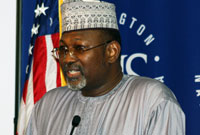High Tech Voting in a Low-Tech Country

Professor Attahiru Jega, chairman of the Independent Nigerian Election Commission, spoke at SAIS on Nigeria's largely successful elections last month. It was a great conversation and well-deserved victory lap in which a number of NDI staff participated. (The elections were covered ad nauseum previously by your faithful NDItechies.) There were some great lines in there - "What we had was not a credible election - it was an *in*credible election!" - but the most fascinating parts to me were the ways in which INEC used both high tech sophisticated systems and some of the most basic concepts possible to get the least corrupt election in Nigerian history. On the high-tech end, tracking devices in ballot boxes ensured that each got to their target without being diverted along the way. Sophisticated laptops were used to digitally capture the fingerprints of each voter and cross-reference them against a central database. (Problematic in a country with spotty power supplies.) Individual ballots were printed with serial numbers and the designs themselves were a closely-guarded secret until the last minute in hopes of removing the window for forgeries. (This backfired when ballots were left too late and couldn't be distributed across the country in time, forcing a 1-week delay in the election.) This high-tech registration drive cost Nigeria over half a billion dollars. Jega certainly thought it was worth it; in his speech he said that the voter list that came out of the process was the most valuable thing that the government possesses. The low-tech part was at least as important as all the snazzy technology. Ballots were printed on different colored paper in a region so they couldn't be swapped between neighboring boxes. Fingers were inked to detect fraud. Most time-consumingly, people had to stand in line to get accredited to vote before noon. After noon those accredited would queue up to vote again - making it very difficult to do multiple voting. Of course, this also puts a huge burden on the voters; an an entire day is needed to participate in the election. On each of three weeks in a row. My sense was that Nigerians were very proud of the results and seem to have found all the difficulty and expense worth it in pulling off the most incredible credible election I've seen.
